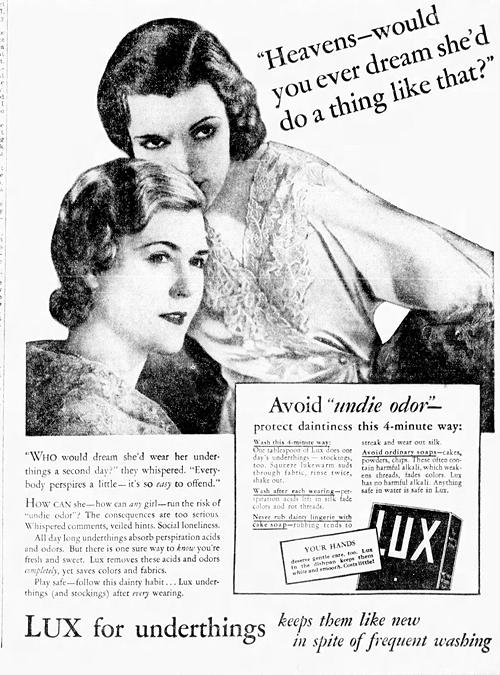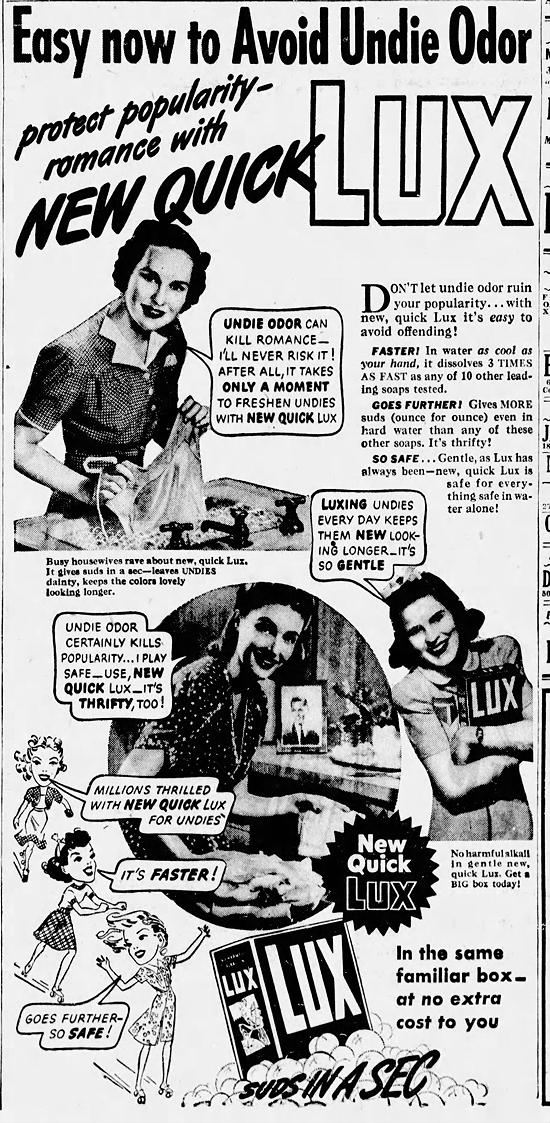Avoid Undie Odor
Throughout the 1930s and 40s, the marketing team for Lux soap repeatedly warned consumers that if they didn't wash their clothes everyday, they risked having "undie odor". Some details from Suellen Hoy in her book Chasing Dirt: The American Pursuit of Cleanliness:
Lux soap was also responsible for the "undies are gossips" campaign.


Lever Brothers, the makers of Rinso, Lifebuoy, and Lux soap, revised its advertising copy over the years to reflect the changing cultural meanings of soap itself... In 1916, Lux was "a wonderful new product" for "laundering fine fabrics:; by the mid-twenties it could also preserve "soft, youthful, lovely feminine hands" and, by the early thirties, prevent "undie odor" as well—"She never omits her Daily Bath, yet she wears underthings a SECOND DAY."
Francis Countway, the president of Lever Brothers and the individual most responsible for the "discovery" of body odors and the "stop smelling" ad pitch, was inspired by Listerine's successful advertising campaign against the previously unknown halitosis. Countway and his associates admitted, while Lever Brothers' business boomed, that they cared little "about the opinions of softies who think that the Body and Undie Odor copy is disgusting." They were simply doing their job, "bringing cleanliness into a dirty world."
Francis Countway, the president of Lever Brothers and the individual most responsible for the "discovery" of body odors and the "stop smelling" ad pitch, was inspired by Listerine's successful advertising campaign against the previously unknown halitosis. Countway and his associates admitted, while Lever Brothers' business boomed, that they cared little "about the opinions of softies who think that the Body and Undie Odor copy is disgusting." They were simply doing their job, "bringing cleanliness into a dirty world."
Lux soap was also responsible for the "undies are gossips" campaign.

Wilmington Evening Journal - Feb 9, 1932

Kansas City Star - Apr 24, 1940
Comments
Don't bring on the funk!
Posted by KDP on 04/08/21 at 09:36 AM
Just don't wear underwear then.
Posted by S. Norman on 04/08/21 at 09:58 AM
To be fair... I'll wear my shirts more than once, and my jeans all week, but I wouldn't dream of wearing my underwear twice, nor my socks. Especially not my socks.
Posted by Richard Bos on 04/10/21 at 05:23 AM
“Yeah, her undies smell like a mix of a sewer and dead animals. But she puts out, so I’m ok with it...”
Posted by Brian on 04/12/21 at 02:01 PM
Commenting is not available in this channel entry.

Category: Hygiene | Advertising | Underwear | 1930s | Smells and Odors